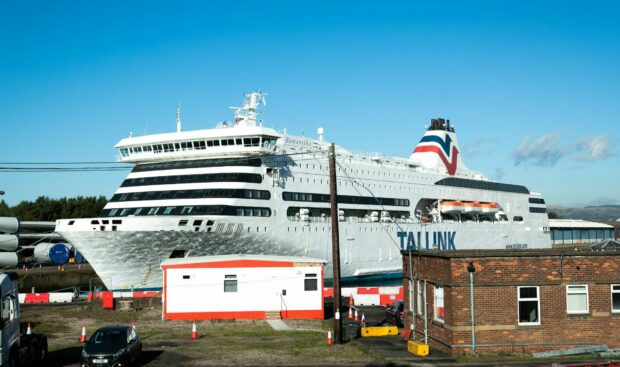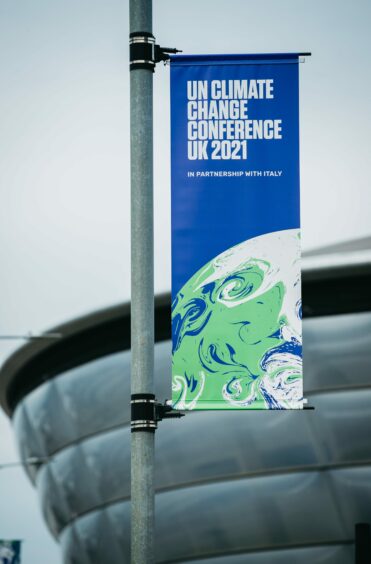
Cruise ships used to house conference staff during Cop26 could cause Covid outbreaks and begin a new wave of infections, public health experts have warned.
Two huge vessels will be berthed on the River Clyde to provide accommodation for workers during the climate summit, which will attract about 25,000 delegates to Glasgow.
Scottish Government adviser and public health professor Devi Sridhar previously called cruise ships floating germ factories and urged holidaymakers to avoid them.
Cop26 organisers have sourced two ships from an Estonian operator to provide accommodation for “security and production staff” amid a shortage of hotel rooms and soaring room rates in Glasgow.
Tallink’s MS Romantika, which has capacity for 2,500 people, has already berthed at King George V dock, next to Braehead Shopping Centre in Renfrew. A second cruise ship, MS Silja Europa, will provide 3,123 more beds. Shuttle buses will take those on board to and from the summit.
Dr Rowland Kao, a professor of epidemiology at Edinburgh University, said: “Cruise ships are likely places with high transmission of Covid because of enclosed spaces, especially if there is poor ventilation where people come into close contact. Given how transmissible the delta variant is, even to vaccinated individuals there will be risks. So lots of testing is going to be important.”
Dr Jeremy Rossman, honorary senior lecturer in virology at the University of Kent, said: “We already saw for the G7 Summit in Cornwall the dramatic rise is cases following the meeting. It is very possible something similar could occur with the Cop26 meeting unless significant precautions are taken, which, given the easing of restrictions in Scotland, appears unlikely.
“This risk is elevated with the idea of hosting many delegates on local cruise ships. As with any indoor environment, measures can be taken to minimise virus transmission. However, the close spaces of a cruise ship, combined with many shared spaces and support staff, creates a high risk of virus transmission.
“Even with precautions taken on cruise ships, we have still seen outbreaks occur. As the guests on the ships will be moving back and forth from the city and meeting site, the risks of virus transmission further increase.”
Professor Andrew Watterson, an expert in public health at Stirling University, said: “Much more information needs to be provided to reassure the population of Glasgow and the visitors that there will be no increased Covid risk to either group from the use of cruise ships.
“If the cruise ship occupants come from all over the world, and if there are not rigorous requirements on vaccination and testing along with on-board Covid mitigation measures, the cruise ships could prove to be sources of significant virus transmission in the city. Being in the one port for several days with ship occupants possibly moving around the central belt and beyond may present unusual Covid control challenges.
The Diamond Princess was the highest profile cruise ship hit by Covid during the pandemic, with the February 2020 outbreak eventually hitting 712 of the 3,711 people on board and claiming the lives of at least 14.
Sridhar told an audience at Edinburgh International Book Festival in the summer to permanently avoid cruise ships. She said: “I would say, as a public health person, don’t go on a cruise ship ever…I just think cruise ships and infectious diseases are, they’re not meant to go together.”
Tweeting about the Diamond Princess in February 2020, Sridhar said: “Things that public health researchers stay away from: 1. Cruises floating germ factories.”
Cop26 said the Scottish Government and NHS Greater Glasgow and Clyde were consulted about the cruise ships plan and a rigorous Covid testing system will be in place.
NHS Greater Glasgow and Clyde said: “We have been working with event organisers for some time to ensure Cop26 can proceed with as little detriment to the current public health situation.
“As ever, we will need everyone to play their part in reducing any potential impact on our health and care services. This includes regular lateral flow tests, when you have no symptoms, to help combat the spread of Covid, social distancing where possible, and good hand hygiene.
“If anyone has Covid symptoms, they should self-isolate immediately and arrange to take a PCR test.”
The Scottish Government said: “We expect all hotel accommodation providers for Cop26 to follow the relevant Scottish Government guidance for Covid-19 mitigation.”
Tallink said: “All our crew members are vaccinated, they were PCR tested before travelling to the UK, they wear face masks and, in some key areas, gloves. They will also be taking regular lateral flow testing throughout the whole charter.
“All crew are in single cabins. Plexi-glass partitions are in place at key customer service points, rigorous cleaning and sanitising is taking place on board with sanitising stations all around the ship.”

Enjoy the convenience of having The Sunday Post delivered as a digital ePaper straight to your smartphone, tablet or computer.
Subscribe for only £5.49 a month and enjoy all the benefits of the printed paper as a digital replica.
Subscribe © Andrew Cawley
© Andrew Cawley